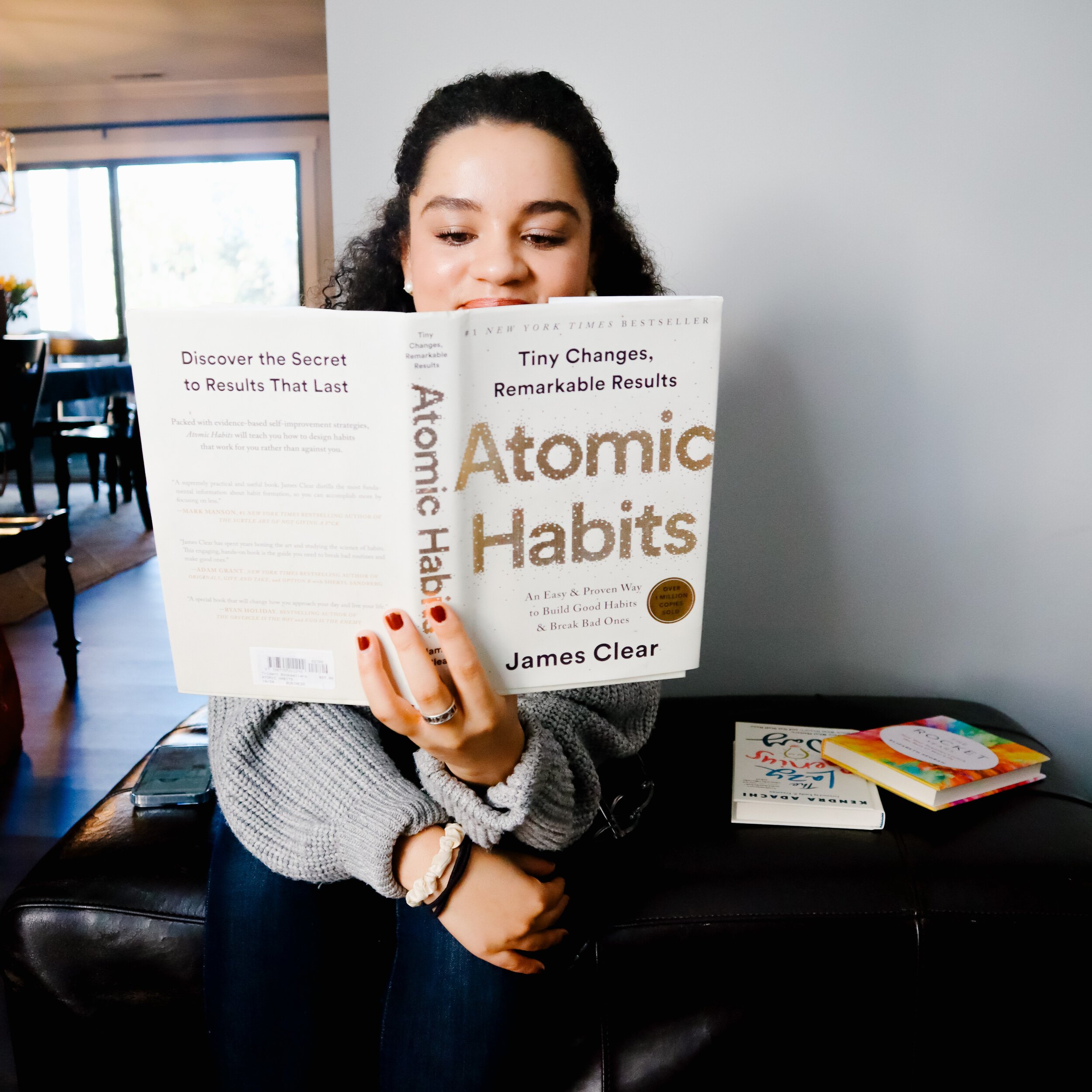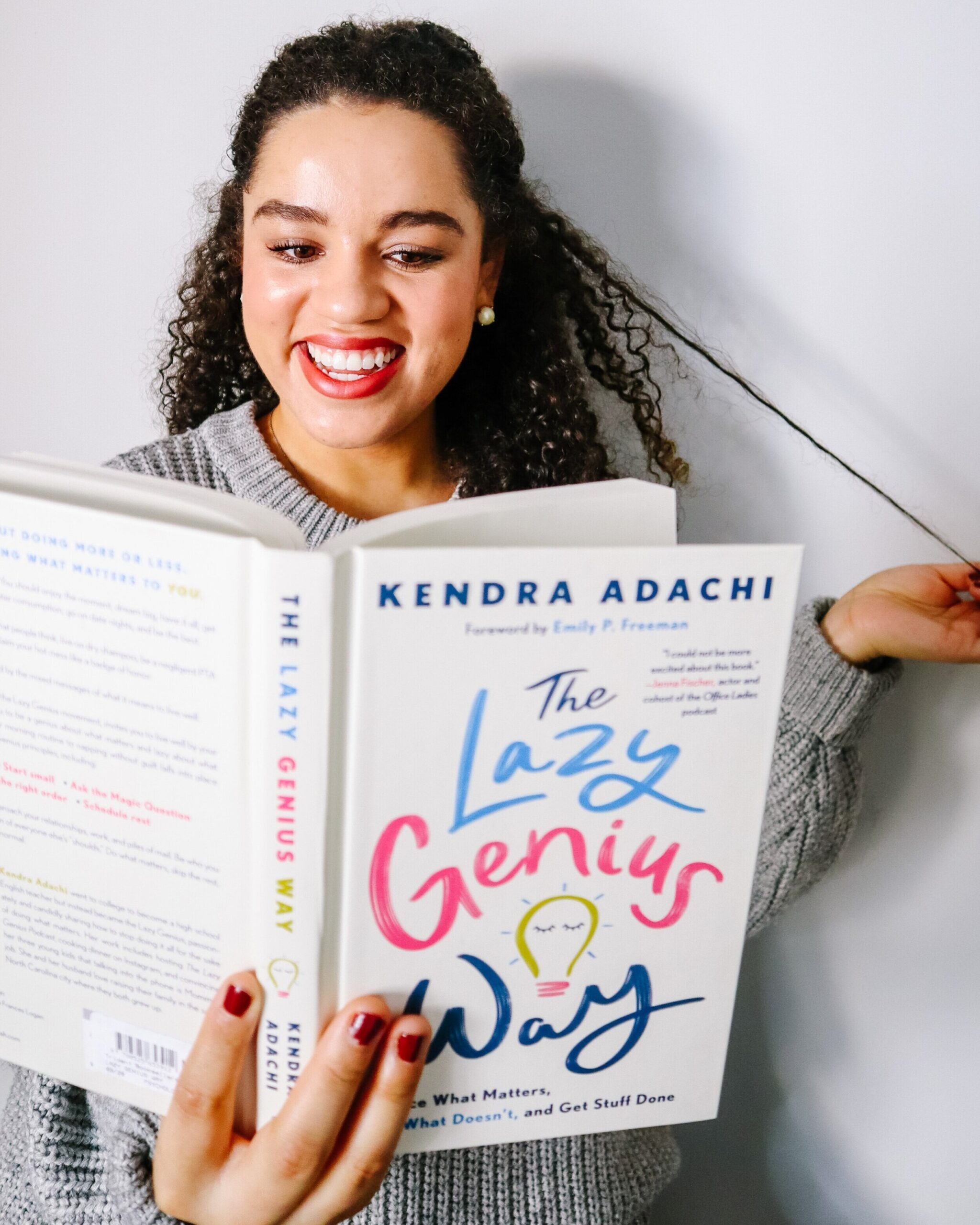Nine tools, podcasts, and books to help set and achieve your goals
As much as I love the ritual of sitting down to write out my goals in my goal planner, I don’t always have my goal planner with me. Shocking, I know, especially when you consider how often I refer to it during my week. If I’m away from my desk or on the go running errands, I need a way to track my goals. If you prefer digital planning or goal-setting already, or if you’re curious what’s out there to help you, I’m going to share with you the apps and tools I think best complement goal-setting and goal-achieving. Additionally, I’ll talk about some books and podcasts–both goal-setting and goal-setting adjacent–that have helped me stay motivated to approach another day in this wild world!
These are my thoughts and opinions alone. I have no affiliation with any of the authors or companies mentioned in this post.
APPS
Way of Life Habit Tracker
Way of Life is a free app available on Apple and Android devices. It’s a beautiful, intuitive habit tracker that motivates you to build a better, stronger and healthier you.
The app allows you to input the habits you track as either a complete routine or a singular habit. Every day, you’ll go in and select a YES or NO whether you completed the habit or routine for that day. Easy enough, right? Usability is so important for an app with straightforward functionality. That’s why Way of Life’s ability to set reminders and push notifications to check in during the day–the gentle nudge–is so important to me. I get lost in the flow of the day and forget to track my habits. You can use this app to track your habits in real time.
For each of the habits you track, you can add notes about what’s working and what isn’t to refer back to. Good habits and routines aren’t built overnight, but Way of Life allows you to build those healthy habits over time. In the free version you can track up to 3 habits, but in the paid version – which costs $6.99 (a one time payment) you can track unlimited habits. I focus on three or fewer habits at a time, so the free version is perfect for me!
StickK
StickK calls itself a “commitment platform,” which is a way of framing goal setting in a markedly different context. StickK helps users define their goal (whatever it may be), acknowledge what it’ll take to accomplish it, and leverage the power of putting money on the line to turn that goal into a reality.
StickK’s mission is to redefine goal-setting using data-driven techniques that empower behavioral change. They believe that with the right tools and resources, anyone can transform their goals into reality. StickK is unique in that it asks their users to sign “Commitment Contracts” and pledge money to back up their commitment. A Commitment Contract is a binding agreement you sign with yourself to ensure that you follow through with your intentions—and it does this by utilizing the psychological power of loss aversion and accountability to drive behavior change.
In short: You bet on yourself to complete your goal. The whole goal process is monitored by a “referee” – aka an accountability partner. If you complete your goal you get your money back. If you fail to check in with regular progress updates, or you fail to reach your goal, you don’t! You can choose to donate the money to a randomly-selected charity (which I love), or you can give it to a friend or family member. While the financial commitment is an optional piece, behavioral scientists have shown that when there’s a financial incentive to completing our goals, there’s an extra layer of motivation and accountability and we’re significantly (StickK says 3x) more likely to complete it!
RoutineMeister
RoutineMeister is another app with a free and paid version. This may be a familiar name you’ve heard me reference before. Now that I’ve used it for a few months, I feel like I can share my experience with the app a little better. A lot of my goals (and many of yours, surely) revolve around creating some sort of fulfilling routine. Maybe it’s a morning or evening routine, or another routine that keeps us focused throughout the day.
RoutineMeister is my go-to app for routine tracking. The free version allows you to set up one daily routine for free, whereas the paid version allows you to set up as many routines as you want. For example, if I had a weekday morning routine and a weekend morning routine, I’d need the paid version of the app. Thankfully, RoutineMeister only costs $3.99 (a one-time purchase), so the upgrade won’t break the bank for an app that is supremely easy to use.
The thing that differentiates RoutineMeister from other routine apps is that every action in your routine is timed. You get to set the action items to include in your routine, but you also get to set a time duration attached to each element of your routine. Attaching a timed component to each step of my morning routine works because I have an additional accountability step. For example, let’s take my morning routine: I hit the snooze button once, which gives me 9 extra minutes. I brush my teeth and I have 4 minutes allotted for that. From there, I head downstairs to feed my dogs, make coffee, and journal — each of those individual tasks is allotted a certain time as well. So on, and so forth.
You’re also able to attach Pomodoro blocks to specific tasks. If you are not familiar with Pomodoro time blocking, it’s a 5:1 work/rest productivity technique that people swear by, my partner John Michael among them. Overall, if having a timed component to your routines would be helpful, I can’t recommend RoutineMeister enough.
Want to see these apps in action? Check out this video!
BOOKS
Atomic Habits by James Clear
This book makes the rounds each year in December and January with the rush of “new year, new me” intentions and goals we set. Habits are the backbone behind good routines, which in turn provide fertile ground for goal-achieving. Habits also seem SO fleeting until you nail down “good” ones.
James Clear gives you many of the tools you need. He shares that we are what we do; new intentions like “I want to run my first 10k race” are more lasting if you frame them as “I am a runner.” Overall, the book–a quick read–does a great job offering proven strategies to swap out bad habits for good ones. I read this book once a year to remind myself just how simple these changes are.
The Lazy Genius by Kendra Adachi
I preach “progress over perfection” when it comes to planning your life. This is one of the main tenets of Kendra Adachi’s Lazy Genius podcast and her book, The Lazy Genius. Which is probably why the book resonates so heavily with me. The thrust of The Lazy Genius is to influence the way you approach tasks and to-dos. When people ask me for a book recommendation to get out of a rut, I suggest The Lazy Genius in tandem with Atomic Habits. I feel like this book builds on Atomic Habits, especially when Adachi talks about the importance of habit sequencing–the order in which you do things matters. This is another easy weekend read–you’ll tear through it.
When by Daniel Pink
My mom first suggested I read this book years ago in school. I wish I’d listened to her! The field of behavioral science is filled with books about timing and sequencing, but the idea of “bio-hacking” is a little much for me. I like When (not to be confused with The Power of When–another great book covering similar topics) because the author, Daniel Pink, makes the case for scheduling your day around your natural circadian rhythms. Designing your ideal day is a concept that appeals strongly to me! Pink explains that while your individual rhythm may vary slightly, nearly everyone belongs to one of 3 groups, or chronotypes (4 chronotypes if you’ve read The Power of When). Moreover, most people fall in one group, or chronotype. Your chronotype is really a description of the natural peaks and valleys of hormones and energy you have during the day. Daniel Pink prescribes certain times of day for doing your focused work, other times to rest and relax, and by following the natural ebb and flow of your energy and attentiveness, you will get more done. I’ve incorporated this thinking into the way I design my day.
PODCASTS
The truth is, I haven’t found a podcast in the self-help / goal-setting space that has really changed my perspective and approach to goal-setting per se (a good business idea, though?) I suppose you could include the Lazy Genius podcast, but I already mentioned Kendra Adachi’s book, of the same name, above. If you’re more of an auditory learner or if you love the medium of podcasts, I recommend the Lazy Genius podcast. And here are three others!
Unlocking Us by Brené Brown
This is one of two Brené Brown podcasts that I highly, highly recommend listening to. You probably know Brené Brown from her famous TED Talk, or maybe one of her 5 New York Times bestsellers (seriously girl, share some of the genius with the rest of us). But if you haven’t heard the podcast she released at the beginning of 2020, you’ll love the interviews she conducts with some of our world’s biggest heroes, celebrities and thought leaders. They cover topics from vulnerability and “how to apologize” to one of her newest episodes on daily practices. This year has been an exceptionally difficult one for our world, made more fraught by our inability to connect with others the way we’re accustomed to. Because one of Brené Brown’s guiding tenets is the importance of interpersonal connection, I’ve deeply appreciated her weekly podcast sharing her perspective.
Clever Girls Know by Bola Sokunbi
Growing my financial literacy has been a major goal and simultaneously a great struggle for me over the last few years. I don’t create content in the finance or budgeting space because I’ve felt insecure in my knowledge forever. Clever Girls Know is a podcast–and a book, Clever Girl Finance–that I love, no less because it’s created by an incredibly talented Black woman CEO, Bola Sokunbi. The podcast is a finance guide for women all about money. The part I love is that Clever Girls Know intersperses interviews with women who sidehustle and budget their way to pay down debt and achieve financial freedom. My journey in financial literacy is ongoing, but Clever Girls Know has been a great guide for me along the way.
Oprah’s Super Soul Conversations by…Oprah
This is another recommendation my mom turned me onto. Oprah’s Super Soul Conversations: Awaken, discover and connect to the deeper meaning of the world around you with SuperSoul. Hear Oprah’s personal selection of her interviews with thought-leaders, best-selling authors, spiritual luminaries, as well as health and wellness experts. All designed to light you up, guide you through life’s big questions and help bring you one step closer to your best self. This podcast is a complement, I feel, to Brené Brown’s, but with the unmistakable Oprah touch. I’ll always recommend the wisdom and insight from the world’s most successful Black woman.
RECOMMIT TO YOUR GOALS BUNDLE
If all of this talk about goal setting is reminding you about your goals, make sure to check out my Recommitting to your goals printable bundle! If you have trouble shifting your mindset when your carefully-laid goal plan goes awry, I walk you through the process of letting go before setting your sights on a new goal. The bundle also gives you the tools to incorporate goal work into your busy schedule, so you never worry again about making time.





